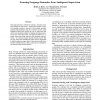Free Online Productivity Tools
i2Speak
i2Symbol
i2OCR
iTex2Img
iWeb2Print
iWeb2Shot
i2Type
iPdf2Split
iPdf2Merge
i2Bopomofo
i2Arabic
i2Style
i2Image
i2PDF
iLatex2Rtf
Sci2ools
106
click to vote
AAAI
2007
2007
Learning Language Semantics from Ambiguous Supervision
This paper presents a method for learning a semantic parser from ambiguous supervision. Training data consists of natural language sentences annotated with multiple potential meaning representations, only one of which is correct. Such ambiguous supervision models the type of supervision that can be more naturally available to language-learning systems. Given such weak supervision, our approach produces a semantic parser that maps sentences into meaning representations. An existing semantic parsing learning system that can only learn from unambiguous supervision is augmented to handle ambiguous supervision. Experimental results show that the resulting system is able to cope up with ambiguities and learn accurate semantic parsers.
AAAI 2007 | Ambiguous Supervision | Intelligent Agents | Semantic Parsers | Such Ambiguous Supervision |
Related Content
| Added | 02 Oct 2010 |
| Updated | 02 Oct 2010 |
| Type | Conference |
| Year | 2007 |
| Where | AAAI |
| Authors | Rohit J. Kate, Raymond J. Mooney |
Comments (0)

